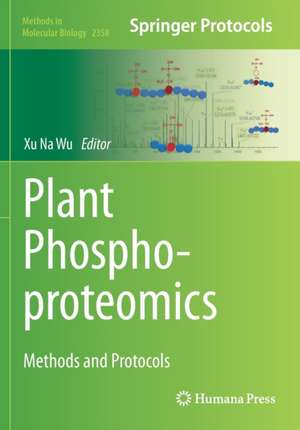Plant Phosphoproteomics: Methods and Protocols: Methods in Molecular Biology, cartea 2358
Editat de Xu Na Wuen Limba Engleză Paperback – 18 iul 2022
Authoritative and practical, Plant Phosphoproteomics: Methods and Protocols serves as an ideal guide for researchers examining phosphoproteomics in the field of plant sciences.
| Toate formatele și edițiile | Preț | Express |
|---|---|---|
| Paperback (1) | 782.24 lei 6-8 săpt. | |
| Springer Us – 18 iul 2022 | 782.24 lei 6-8 săpt. | |
| Hardback (1) | 1224.36 lei 6-8 săpt. | |
| Springer Us – 17 iul 2021 | 1224.36 lei 6-8 săpt. |
Din seria Methods in Molecular Biology
- 9%
 Preț: 791.63 lei
Preț: 791.63 lei - 23%
 Preț: 598.58 lei
Preț: 598.58 lei - 20%
 Preț: 882.98 lei
Preț: 882.98 lei -
 Preț: 252.05 lei
Preț: 252.05 lei - 5%
 Preț: 802.70 lei
Preț: 802.70 lei - 5%
 Preț: 729.61 lei
Preț: 729.61 lei - 5%
 Preț: 731.43 lei
Preț: 731.43 lei - 5%
 Preț: 741.30 lei
Preț: 741.30 lei - 5%
 Preț: 747.16 lei
Preț: 747.16 lei - 15%
 Preț: 663.45 lei
Preț: 663.45 lei - 18%
 Preț: 1025.34 lei
Preț: 1025.34 lei - 5%
 Preț: 734.57 lei
Preț: 734.57 lei - 18%
 Preț: 914.20 lei
Preț: 914.20 lei - 15%
 Preț: 664.61 lei
Preț: 664.61 lei - 15%
 Preț: 654.12 lei
Preț: 654.12 lei - 18%
 Preț: 1414.74 lei
Preț: 1414.74 lei - 5%
 Preț: 742.60 lei
Preț: 742.60 lei - 20%
 Preț: 821.65 lei
Preț: 821.65 lei - 18%
 Preț: 972.30 lei
Preț: 972.30 lei - 15%
 Preț: 660.49 lei
Preț: 660.49 lei - 5%
 Preț: 738.41 lei
Preț: 738.41 lei - 18%
 Preț: 984.92 lei
Preț: 984.92 lei - 5%
 Preț: 733.29 lei
Preț: 733.29 lei -
 Preț: 392.60 lei
Preț: 392.60 lei - 5%
 Preț: 746.26 lei
Preț: 746.26 lei - 18%
 Preț: 962.66 lei
Preț: 962.66 lei - 23%
 Preț: 860.22 lei
Preț: 860.22 lei - 15%
 Preț: 652.64 lei
Preț: 652.64 lei - 5%
 Preț: 1055.50 lei
Preț: 1055.50 lei - 23%
 Preț: 883.87 lei
Preț: 883.87 lei - 5%
 Preț: 1141.13 lei
Preț: 1141.13 lei - 19%
 Preț: 491.89 lei
Preț: 491.89 lei - 5%
 Preț: 1038.86 lei
Preț: 1038.86 lei - 5%
 Preț: 524.16 lei
Preț: 524.16 lei - 18%
 Preț: 2122.34 lei
Preț: 2122.34 lei - 5%
 Preț: 1299.23 lei
Preț: 1299.23 lei - 5%
 Preț: 1339.12 lei
Preț: 1339.12 lei - 18%
 Preț: 1390.26 lei
Preț: 1390.26 lei - 18%
 Preț: 1395.63 lei
Preț: 1395.63 lei - 18%
 Preț: 1129.65 lei
Preț: 1129.65 lei - 18%
 Preț: 1408.26 lei
Preț: 1408.26 lei - 18%
 Preț: 1124.92 lei
Preț: 1124.92 lei - 18%
 Preț: 966.27 lei
Preț: 966.27 lei - 5%
 Preț: 1299.99 lei
Preț: 1299.99 lei - 5%
 Preț: 1108.51 lei
Preț: 1108.51 lei - 5%
 Preț: 983.76 lei
Preț: 983.76 lei - 5%
 Preț: 728.16 lei
Preț: 728.16 lei - 18%
 Preț: 1118.62 lei
Preț: 1118.62 lei - 18%
 Preț: 955.25 lei
Preț: 955.25 lei - 5%
 Preț: 1035.62 lei
Preț: 1035.62 lei
Preț: 782.24 lei
Preț vechi: 953.96 lei
-18% Nou
Puncte Express: 1173
Preț estimativ în valută:
149.68€ • 163.10$ • 126.13£
149.68€ • 163.10$ • 126.13£
Carte tipărită la comandă
Livrare economică 23 aprilie-07 mai
Preluare comenzi: 021 569.72.76
Specificații
ISBN-13: 9781071616277
ISBN-10: 1071616277
Ilustrații: XI, 241 p. 29 illus., 26 illus. in color.
Dimensiuni: 178 x 254 mm
Greutate: 0.45 kg
Ediția:1st ed. 2021
Editura: Springer Us
Colecția Humana
Seria Methods in Molecular Biology
Locul publicării:New York, NY, United States
ISBN-10: 1071616277
Ilustrații: XI, 241 p. 29 illus., 26 illus. in color.
Dimensiuni: 178 x 254 mm
Greutate: 0.45 kg
Ediția:1st ed. 2021
Editura: Springer Us
Colecția Humana
Seria Methods in Molecular Biology
Locul publicării:New York, NY, United States
Cuprins
Phosphorylation Site Motifs in Plant Protein Kinases and Their Substrates.- Protein Phosphorylation Response to Abiotic Stress in Plants.- Protein Phosphorylation in Plant Cell Signaling.- Phosphoproteomics Profiling of Receptor Kinase Mutants.- Phosphoproteomics Analysis of Soybean Roots Under Salinity by Using the iTRAQ Labeling Approach.- Universal Sample Preparation Workflow for Plant Phosphoproteomic Profiling.- Mapping Plant Phosphoproteome with Improved Tandem MOAC and Label-Free Quantification.- SILIA-Based 4C Quantitative PTM Proteomics.- Phosphoproteomics Analysis of Plant Root Tissue.- Plant Phosphopeptides Enrichment by Immobilized Metal Ion Affinity Chromatography.- Two-Dimensional Gel Electrophoresis and Pro-Q Diamond Phosphoprotein Stain-Based Plant Phosphoproteomics.- 2-D DIGE Combined with Pro-Q Diamond Staining for the Identification of Protein Phosphorylation for Chlamydomonas reinhardtii: A Successful Approach.- Plant Phosphopeptides Identification and Label-Free Quantification by MaxQuant and Proteome Discovery Software.- Phosphat 4.0: An Updated Arabidopsis Database for Searching Phosphorylation Sites and Kinase-Target Interactions.- Computational Phosphorylation Network Reconstruction: An Update on Methods and Resources.- The Application of an R Language-Based Platform cRacker for Phosphoproteomics Data Analysis.- Kinase Activity Assay Using Unspecific Substrate or Specific Synthetic Peptides.
Textul de pe ultima copertă
This detailed protocol book provides phosphoproteomics techniques currently developed for use in plants, as well as offering a variety of methodologies to analyze different types of plant phosphoproteomic data. Suitable protocols for every stage of the experiment, from protein isolation and phosphopeptides enrichment to large-scale data analysis, have been considered and explored. Written for the highly successful Methods in Molecular Biology series, chapters include introductions to their respective topics, lists of the necessary materials and reagents, step-by-step readily reproducible laboratory protocols, and tips on troubleshooting and avoiding known pitfalls.
Authoritative and practical, Plant Phosphoproteomics: Methods and Protocols serves as an ideal guide for researchers examining phosphoproteomics in the field of plant sciences.
Caracteristici
Includes cutting-edge techniques Provides step-by-step detail essential for reproducible results Contains key implementation advice from the experts
